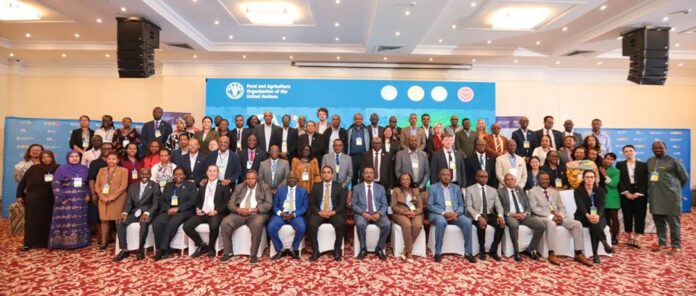The 19th Multidisciplinary Team Meeting (MDT) of the FAO Subregional Office for Eastern Africa was held from 10-13 November 2025. The meeting brought together representatives from Member States, regional bodies, and FAO leadership to discuss a new set of subregional priorities, strengthen partnerships, and identify areas for strategic investment to advance agrifood systems transformation across Eastern Africa.
Held under the theme “Strengthening Partnerships and Investment for Accelerated Agrifood System Transformation and Climate Resilience in the Eastern Africa Subregion,” the meeting included government representatives from the eight countries, alongside regional bodies such as the Intergovernmental Authority on Development (IGAD), the East African Legislative Assembly (EALA), and the East African Parliamentary Alliance (EAPA), as well as technical teams from FAO headquarters, regional, and country offices. These stakeholders shared national and subregional priorities, policy updates, and lessons learned to guide the identification of integrated subregional priorities for the next two years and inform FAO’s strategic planning and investment support.
Representatives from eight Eastern African countries, regional organizations, and FAO staff during the 19th MDT, 10 November 2025
In his opening remarks, Ethiopia’s State Minister for Agriculture, Meles Mekonnen, highlighted the country’s long-standing collaboration with FAO, which spans more than 75 years and covers watershed restoration, soil and water conservation, livestock development, seed systems, mechanization, and value chain improvement. He added; “Agricultural transformation is most effective when strategies are integrated, inclusive, and nationally owned. These past collaborative efforts with FAO not only serve national priorities but also contribute to regional goals, including expanding food availability, improving nutrition, facilitating trade, and building resilient economies.”
FAO’s Assistant Director-General for Africa, Abebe Haile-Gabriel, highlighted bold regional initiatives, from advancing self-sufficiency in strategic commodities and anticipatory action mechanisms, to digital agriculture incubation, integrated livestock strategies, youth agripreneurship, and regional food security frameworks, already shaping policy and practice across Africa. Commending governments, FAO teams, partners, and communities, he noted; “Technical innovations alone will not suffice. To unlock their full potential, they must be supported by sustained political commitment, strong public investment, targeted support to those most in need, blended financing models, and active engagement of the private sector. Above all, they require performance-based monitoring and transparency. Innovation without investment remains a pilot. Innovation with partnerships and resources becomes impact at scale.”
He called on all stakeholders to champion these initiatives in national and regional budgets and mobilize catalytic financing to transform promising ideas into scalable programmes.
On her part, the FAO Subregional Coordinator for Eastern Africa, Farayi Zimudzi, noted the region’s vulnerability to climate shocks and the need to leverage digital agriculture and innovation to accelerate agrifood systems transformation. She highlighted the region’s potential, including its biodiversity, expanding trade infrastructure, growing innovation ecosystem, and youthful population, and noted: “Leveraging digital agriculture and innovation is critical to accelerate agrifood systems transformation in Eastern Africa, and the MDT provides a platform to align regional priorities and harness the region’s considerable potential.” She added: “By working together, governments, FAO, regional organizations, and the private sector can turn innovative ideas into sustainable impact across the subregion.”
The MDT focused on how FAO could catalyze investments and cultivate partnerships for sustainable agrifood systems transformation. In addition, it reviewed progress made against previous development and organizational commitments and assessed alignment of the new priorities with the UN Sustainable Development Cooperation Framework (UNSDCF), the Common Country Analysis (CCA), and FAO Country Programming Frameworks (CPFs). Sessions among FAO country offices facilitated the exchange of lessons learned and tracking of regional progress.
Participants visited peri-urban cluster farms in Adama, including papaya, fish, and dairy farms, to observe practices supporting agrifood system transformation in Ethiopia. The visit provided insights into cluster farming practices that promote efficiency, youth employment, and sustainable production, highlighting the importance of technical support and policy alignment. A dedicated marketplace session allowed country offices to share results, innovations, and partnerships contributing to agrifood systems transformation, facilitating the exchange of experiences and identification of good practices for replication across the subregion.
Coinciding with FAO’s 80th year, the MDT 2025 provided an opportunity to celebrate FAO’s eight decades of work supporting countries and regional partners to improve food production, reduce poverty, and respond to crises. The anniversary was marked in the presence of the Government of Ethiopia, embassies, UN agencies, and development partners.
It was highlighted on the event that FAO, through initiatives such as the Hand-in-Hand Initiative, continues to help countries identify priority value chains, attract investment, and strengthen partnerships for lasting impact.
Turning Priorities into Action for Agrifood Systems Transformation
The MDT discussions informed integrated subregional priorities to shape FAO’s work in Africa for the next two years in accelerating agrifood systems transformation. These include promoting digitalization across the food system, enhancing climate resilience and natural resource management, strengthening local production and food security, supporting agro-industrialization and value addition, expanding market and trade infrastructure, and mobilizing investment and private sector engagement. Inclusive approaches ensure youth, women, and vulnerable communities benefit from resilient livelihoods, nutrition-sensitive agriculture, and social protection interventions.
The MDT wrapped up with a unified call to action to set clear and measurable milestones for subregional priorities; strengthen financial and investment mechanisms; deepen collaboration; and reinforce results-based planning, impact capture, and strategic communication, ensuring lasting impact for agrifood systems transformation in Eastern Africa.
Related Links








